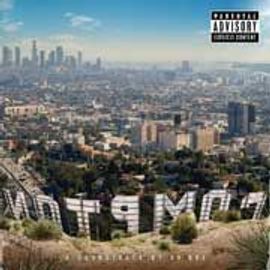

On day-in-the-life-of-a-hustler joint “Like Me”, Game calls out the billionaire headphone magnate for losing touch with his roots: “Dr Dre ain’t got time for this/He wearing Beats, I’ve got my ear to the ground, lil nigga, I’m in these streets.” It’s like Game can’t help himself.Įlsewhere, too many of the songs are standard issue commercial rap tracks that make zero sense in the context of the heartfelt documentary. The audaciously titled “The Chronic” provokes The Good Doctor about his lost opus Detox over the kind of beat that he’s probably collected in stacks of hundreds during the abandoned sessions.
#COMPTON DR DRE ALBUM COVER HD SERIES#
It’s absolutely incredible, then, that Game decides to use Streets of Compton to taunt a legend he spent the series paying tribute to. Dre with the burning intensity that Rick Ross raps about money, but any lingering beef seemed to be buried when the pair traded guest verses on their respective projects last year. Of course, Game’s turbulent relationship with his one-time mentor comes up. There’s an excellent draft pick in rising star Boogie on “Roped Off.” The young father stacks his thoughtful ruminations next to Game’s more gritty rhymes, dropping a punchy verse that decries the violence in his city: “With your kid out shopping, you gon’ still yell ‘Bompton!’?/Man, I done lost hope.” Local Compton rappers are instead given the space to shine. Unlike last year’s sprawling 40-track set The Documentary 2 and 2.5, there’s no expensive list of star guests. “But, shit, everything changed when Ice Cube went solo/Riding shotgun in my brother’s Fase Lolo,” he spits over the rattle and ping of producer Jelly Roll’s swarming electronics. The throwback street-level narrative depicts the world his South Central rap heroes once stood over. Highlight “Death Row Chain” is a play-by-play of west coast rap history through the lens of Game’s criminal resumé. Some songs do stay thematically on-point. Instead, it’s a record that feels like a hastily-assembled collection of loosies with the series’ logo slapped on the cover. Working within Streets of Compton’s framework was an opportunity to abandon all pretense of keeping up with trends and do just that. Dre beats every time he steps into the booth. Despite tugging at just about all the popular sounds in the rap play book over the last decade, he probably wishes he could rap over mid-era Dr. His back catalogue has been built on rhymes about dope slinging and the ghost of Eazy-E. Game should be in his element with this kind of project. It’s disappointing, then, that stacked next to the show, the accompanying soundtrack feels so slight and impersonal. His whole life, warts and all, is out for all to see. The Game opens up about violent dope deals and shakes his head at the bullets that once punctured his son’s car seat. His parents recall the drug addiction, violence and sexual abuse that occurred under the family’s roof. The city’s often-bleak history is covered extensively, with the rapper’s upbringing serving as a test sample of the hardships the people face. Jayceon Taylor’s love of his hometown is laid bare in three-part documentary series Streets of Compton.


 0 kommentar(er)
0 kommentar(er)
